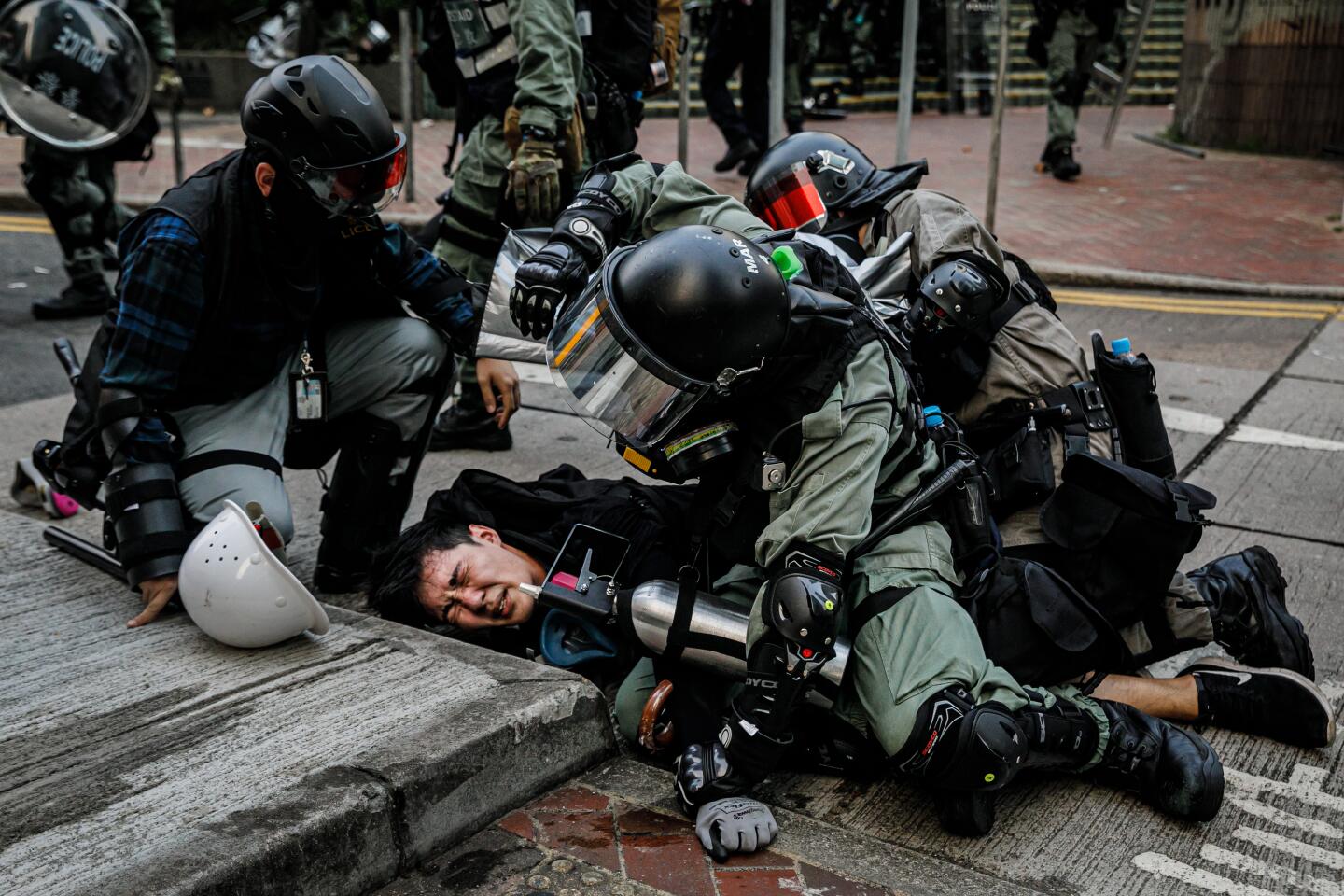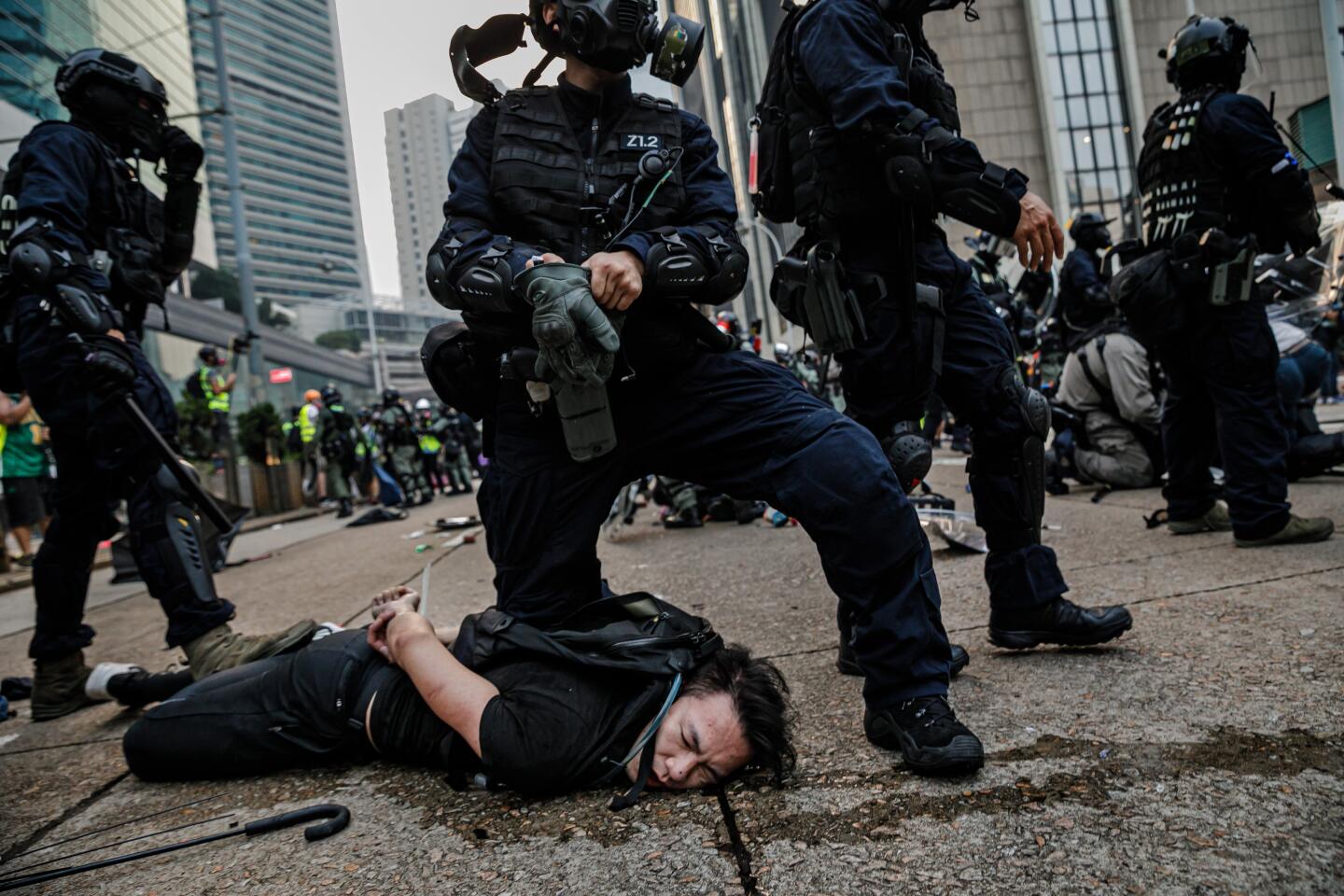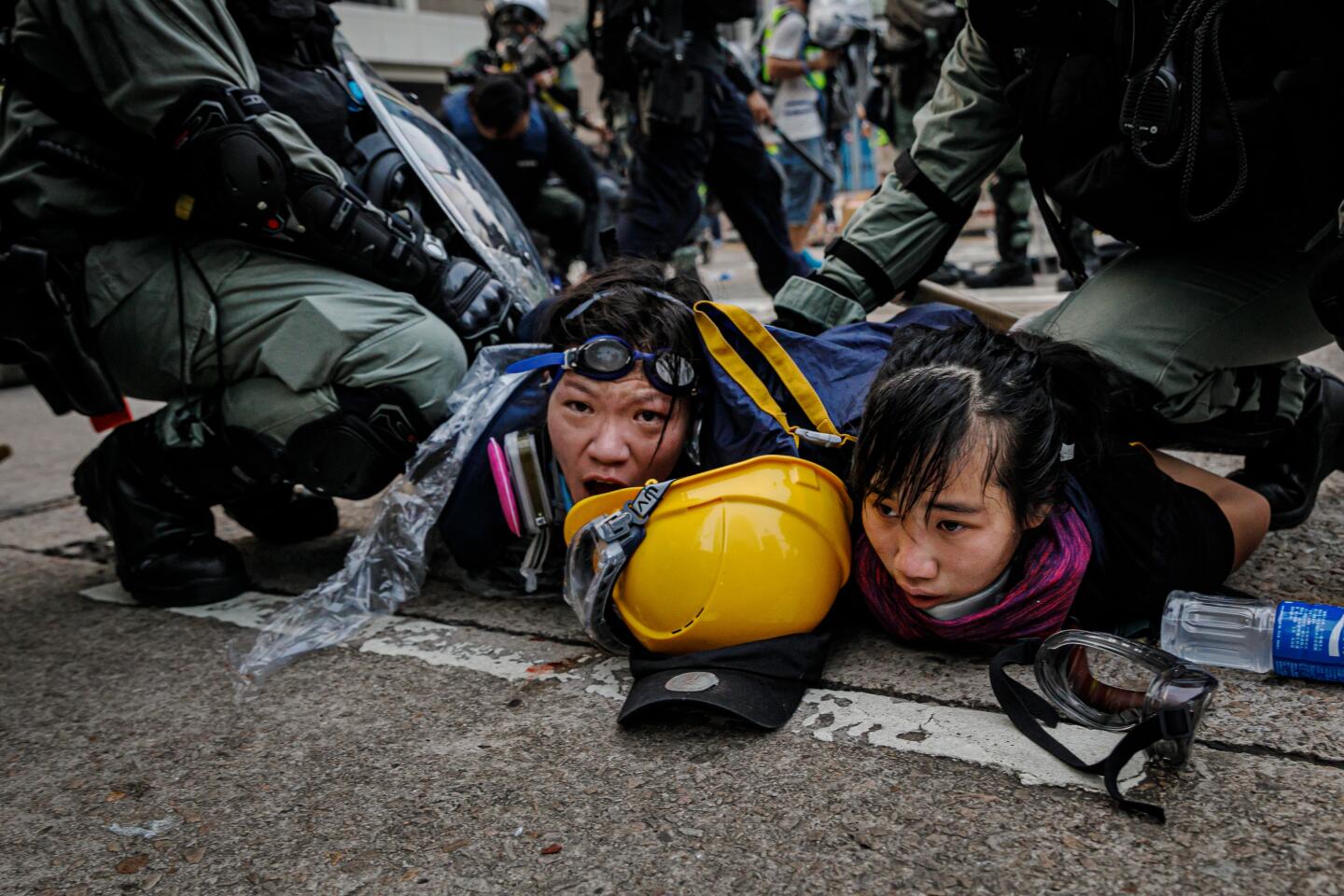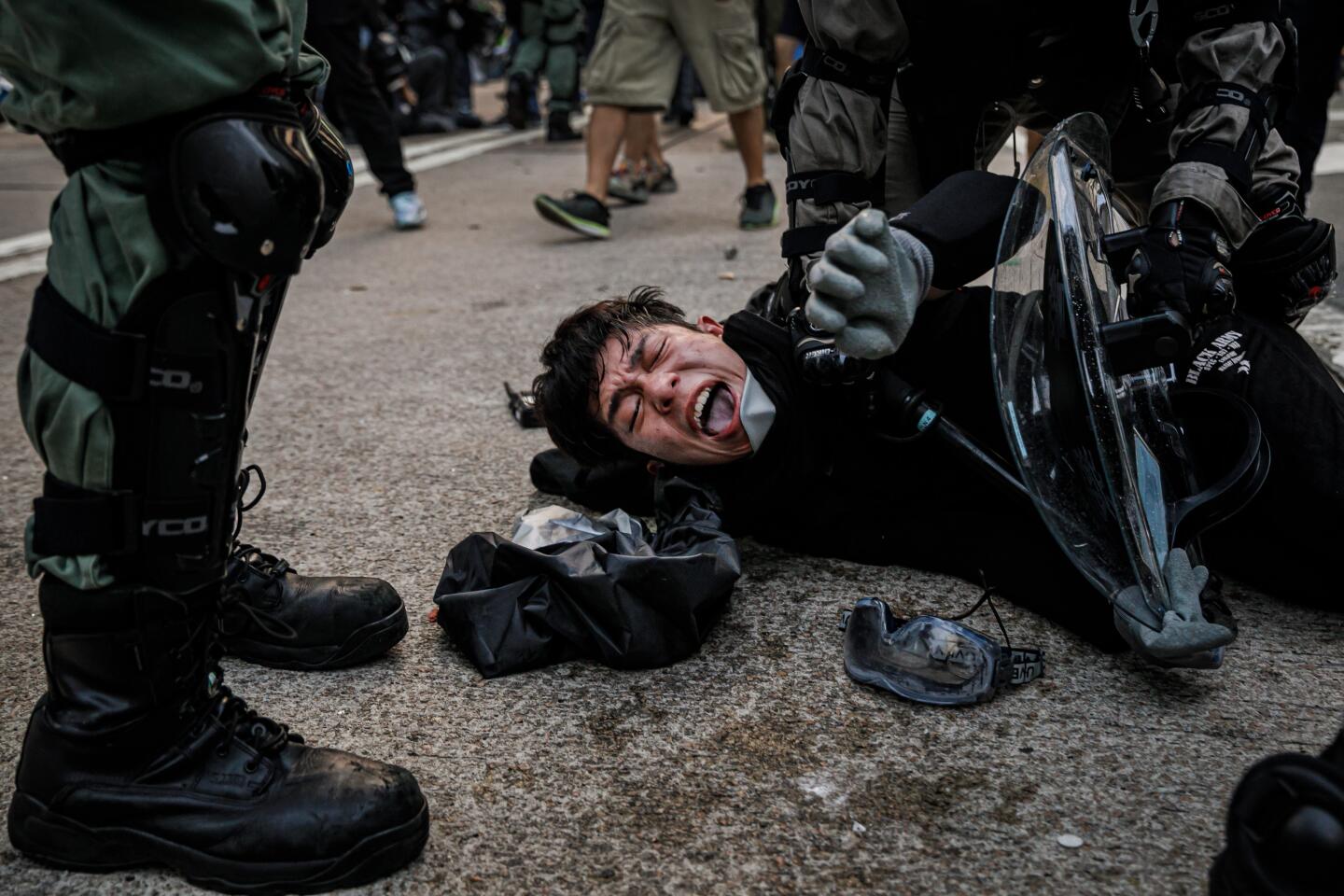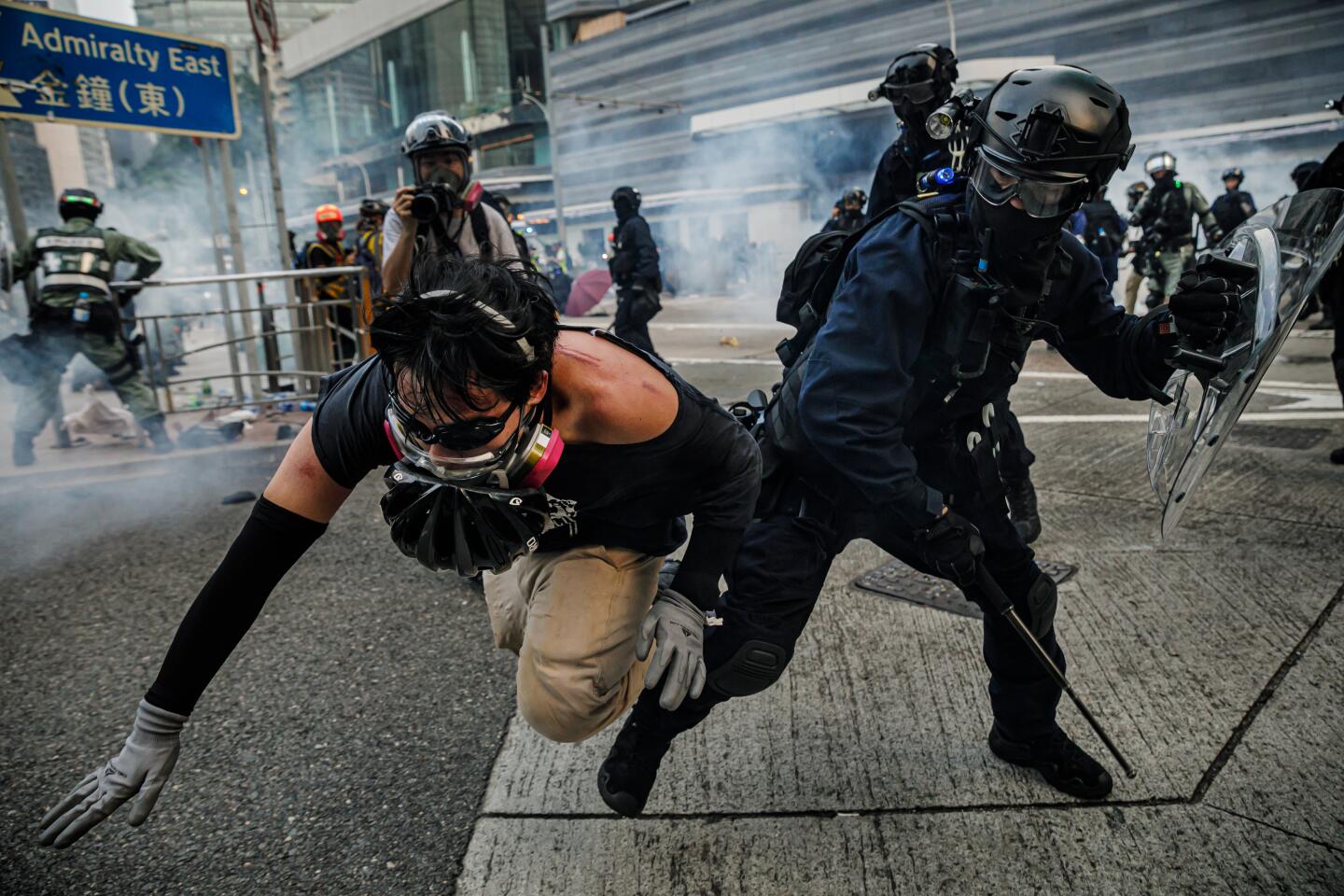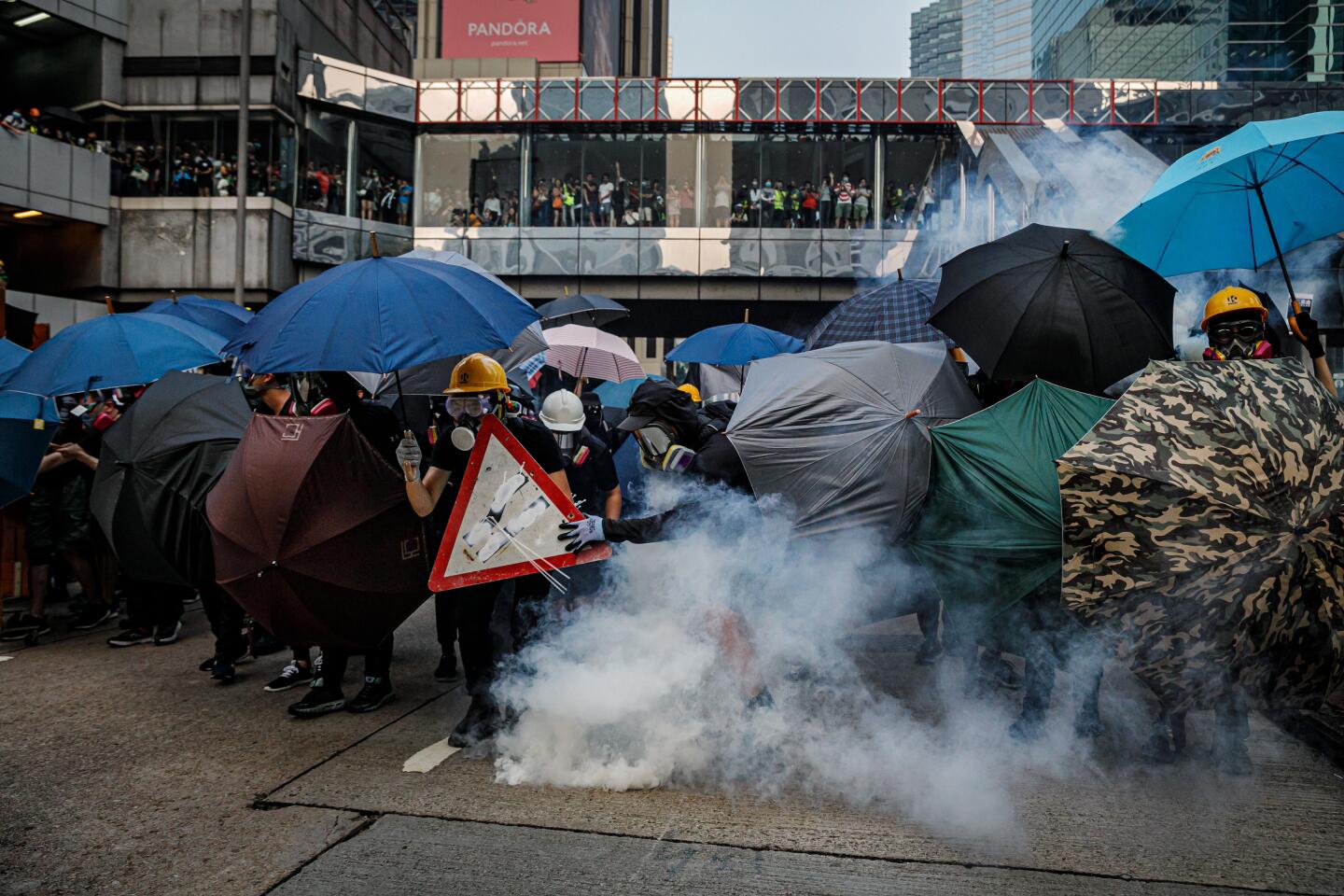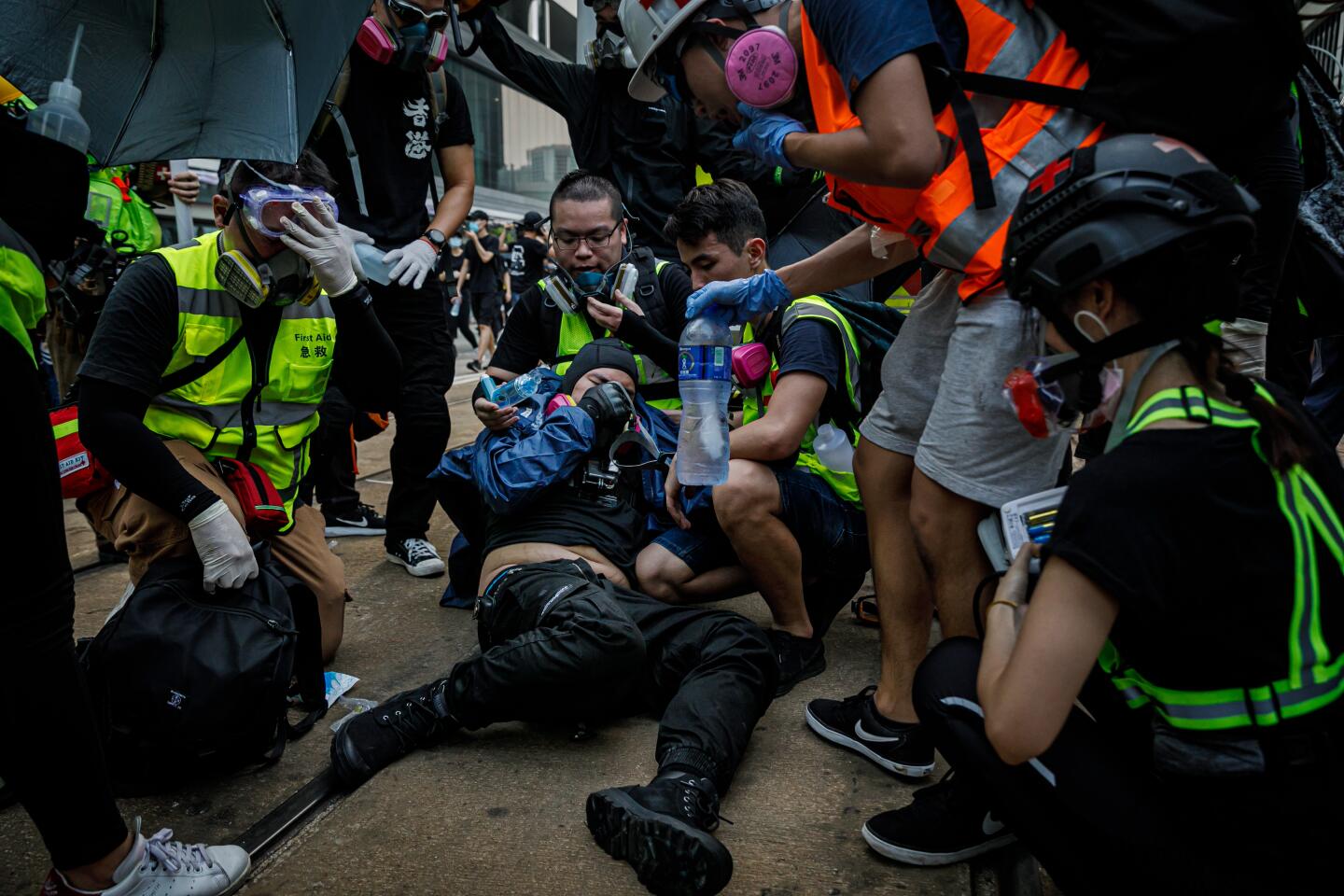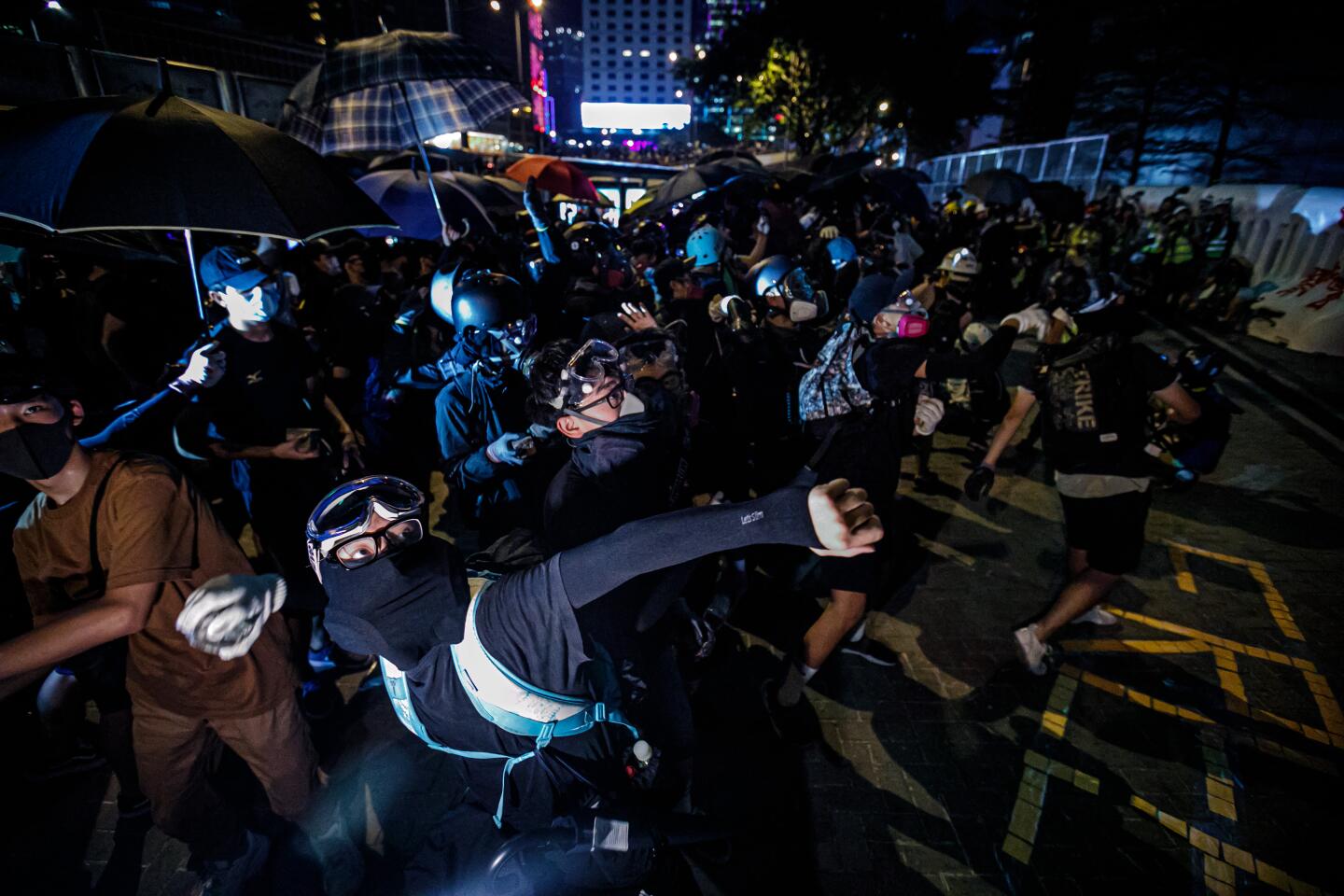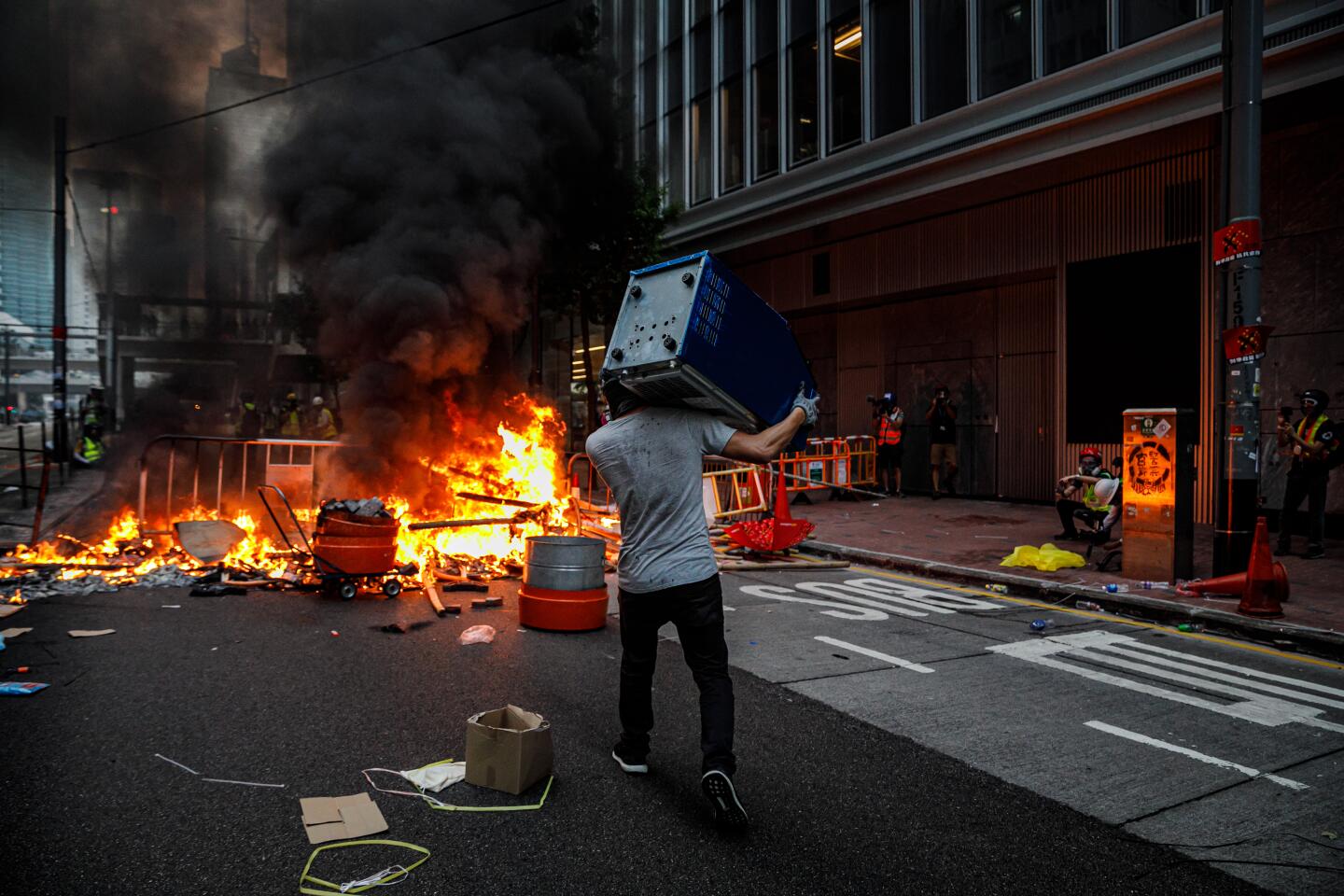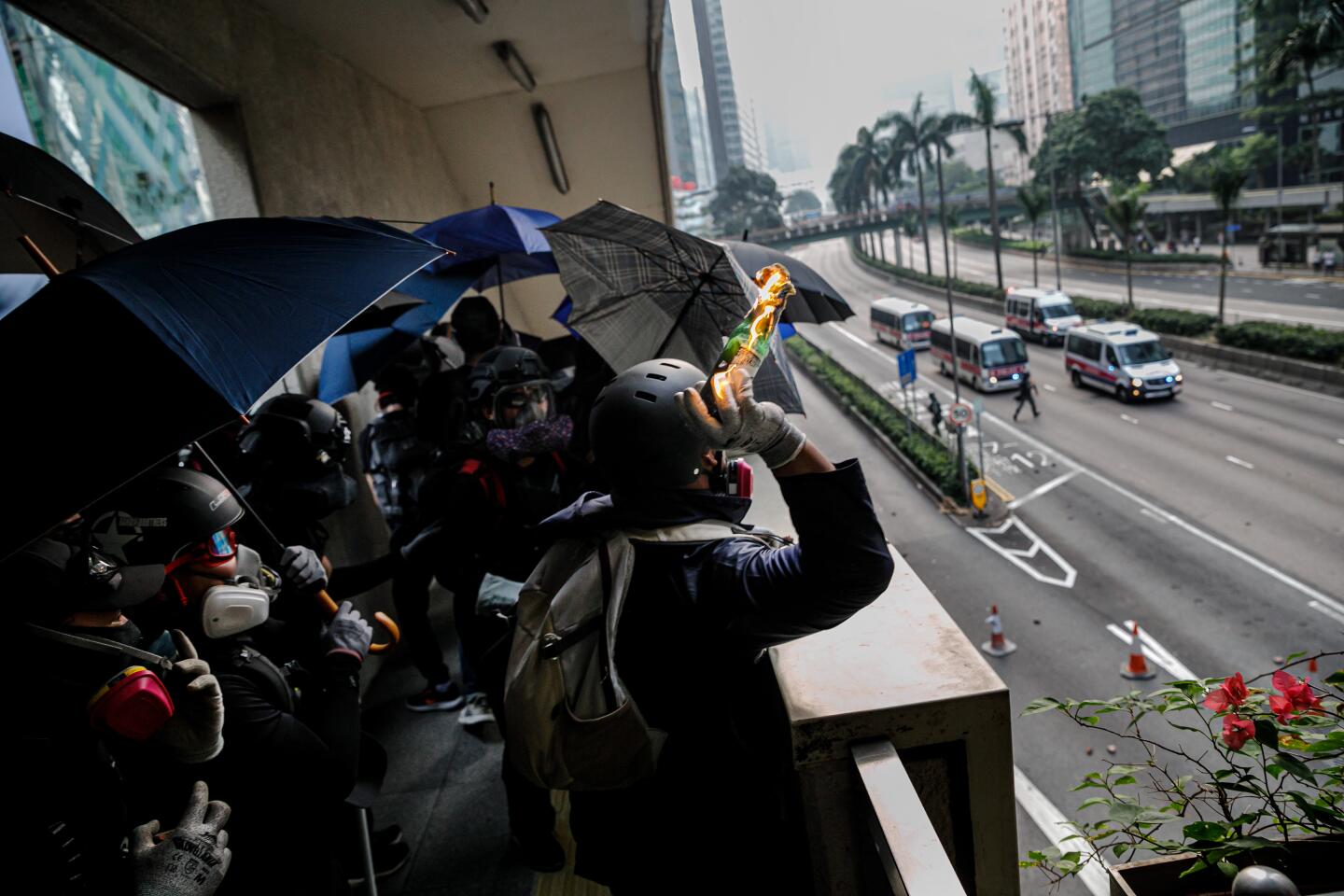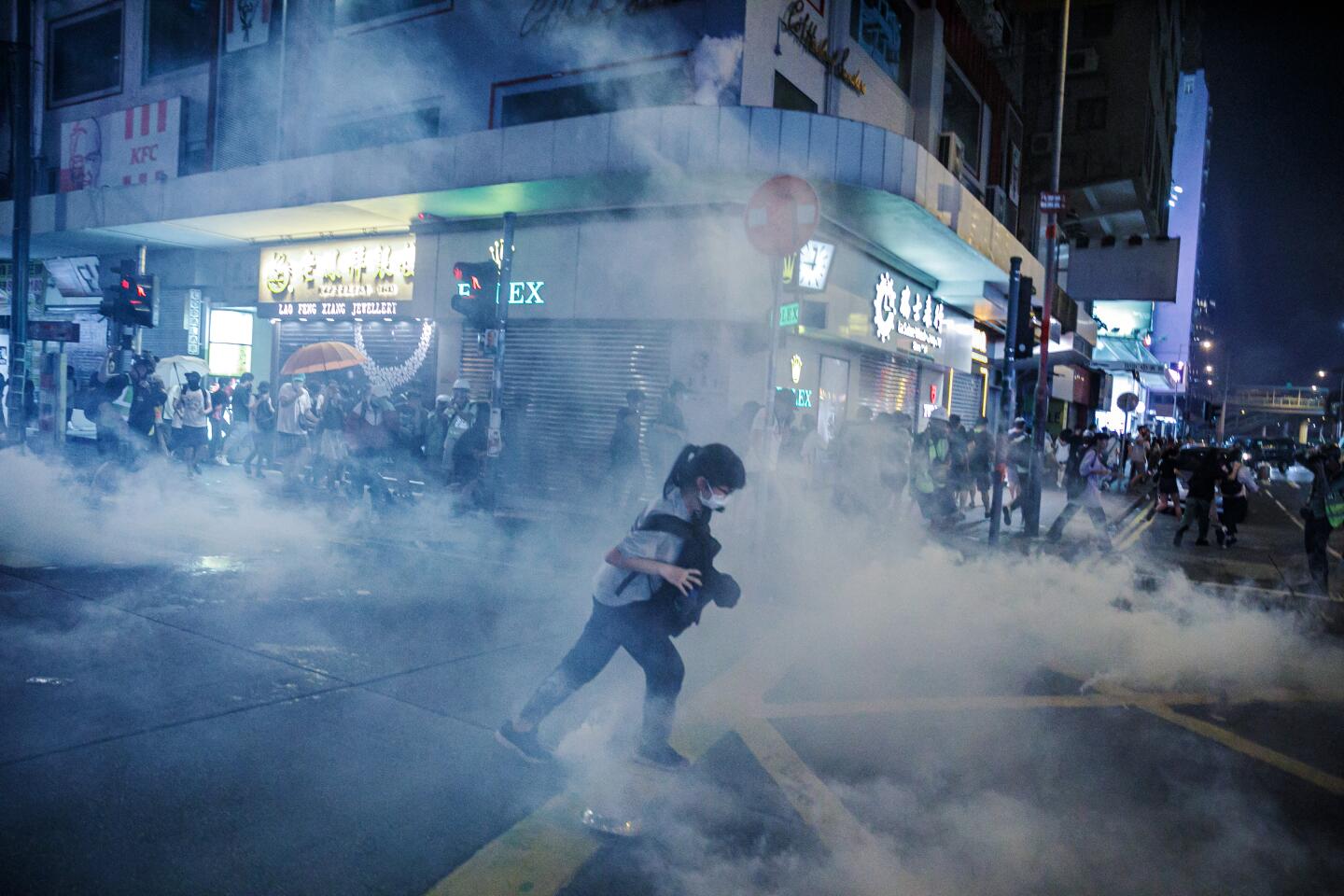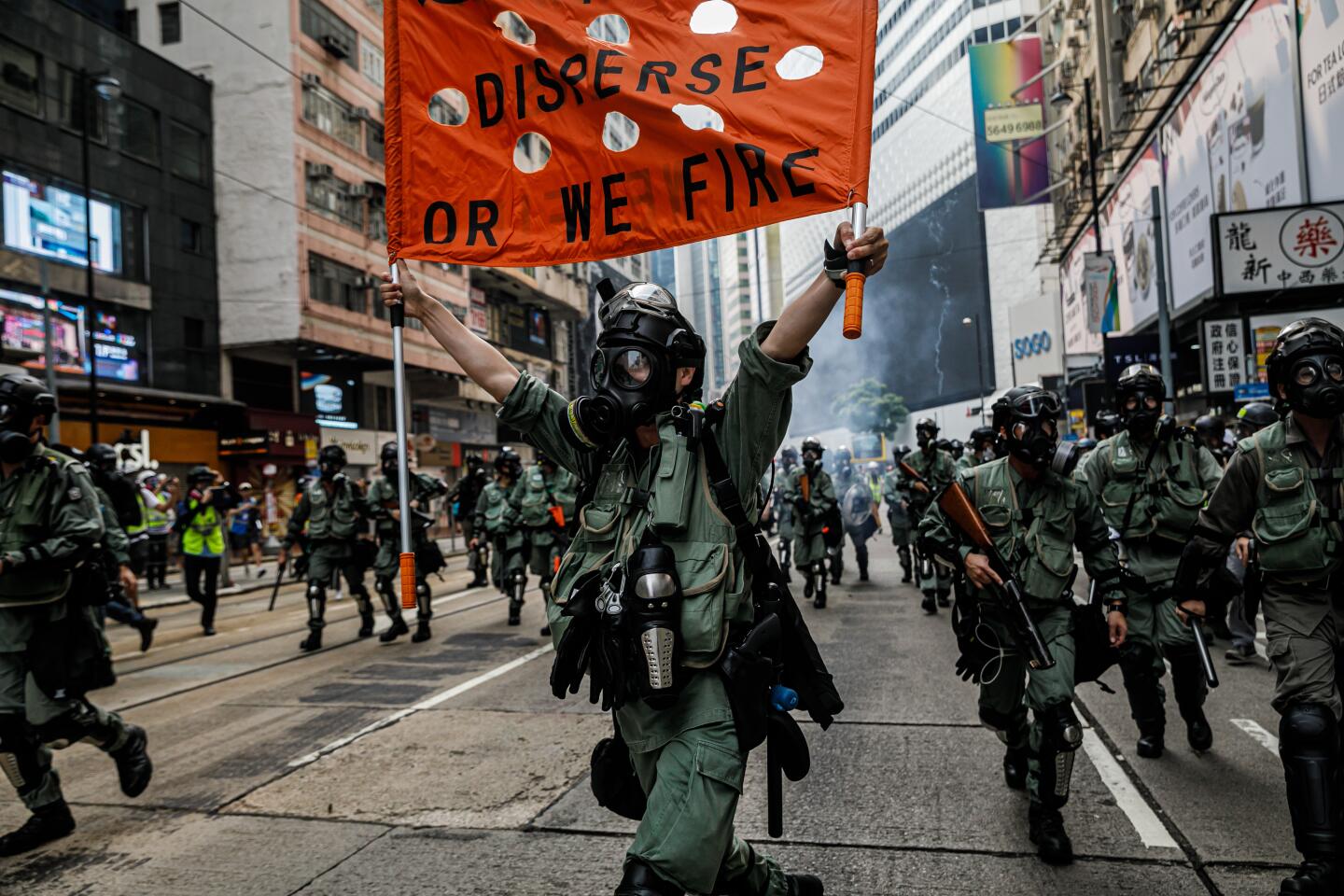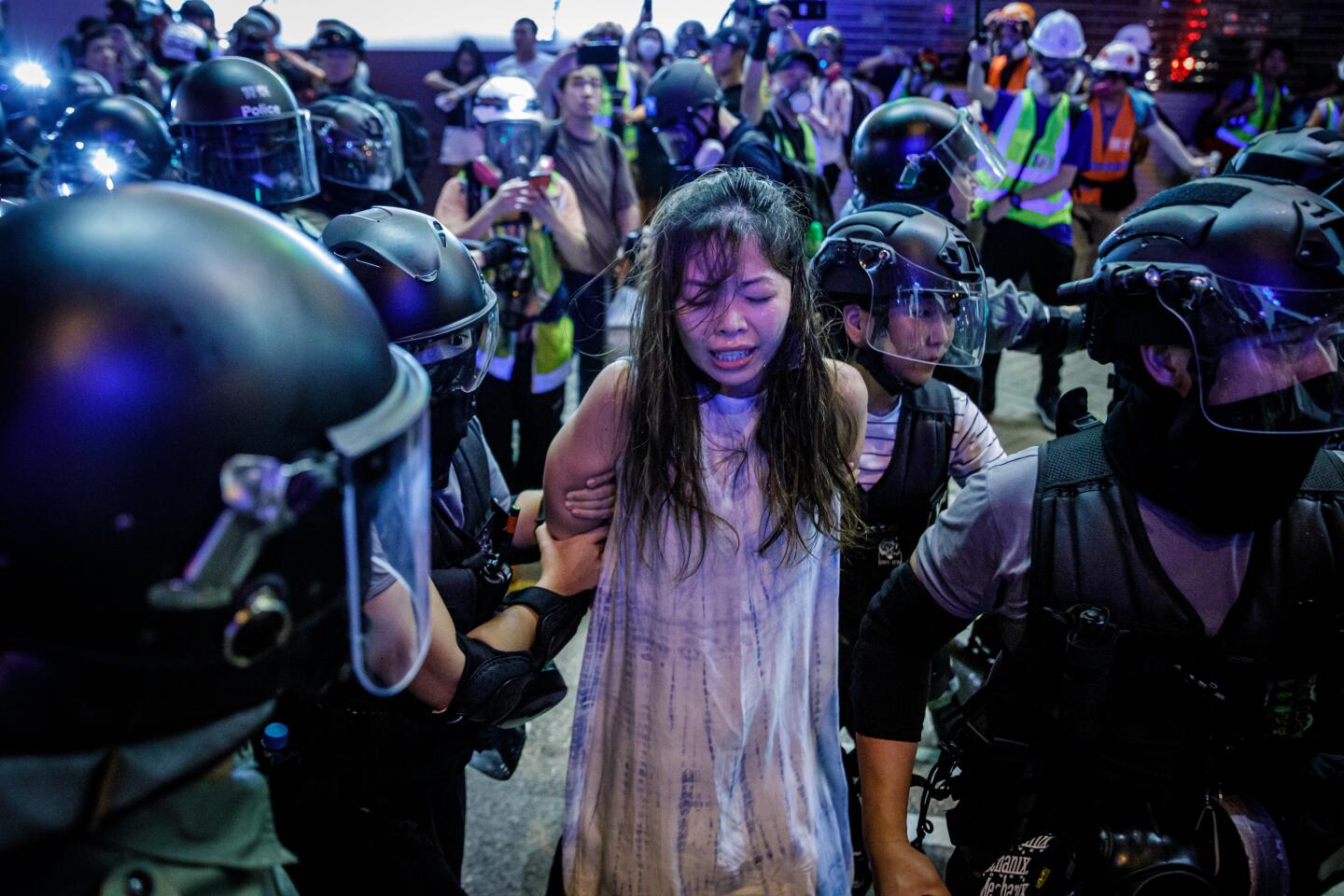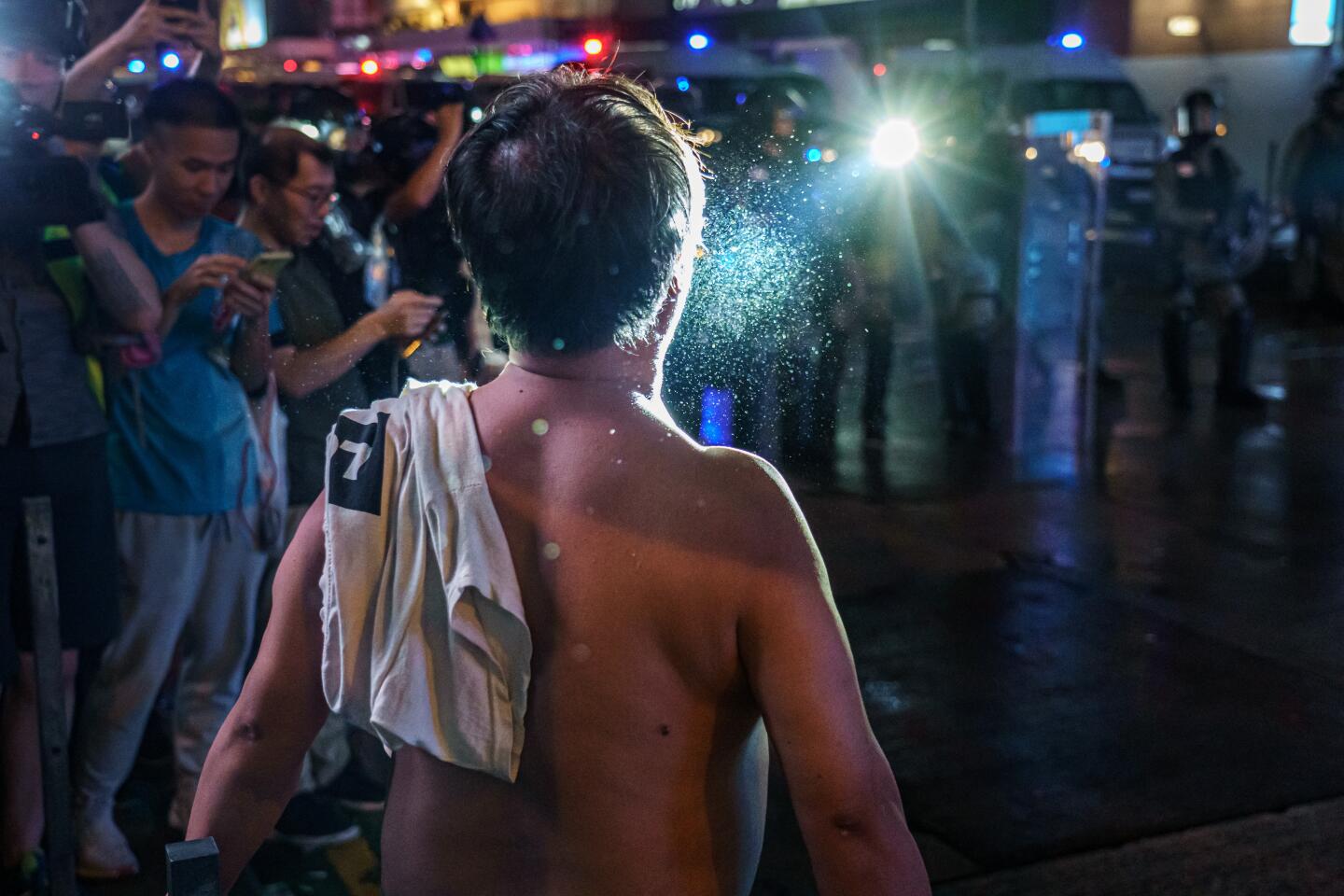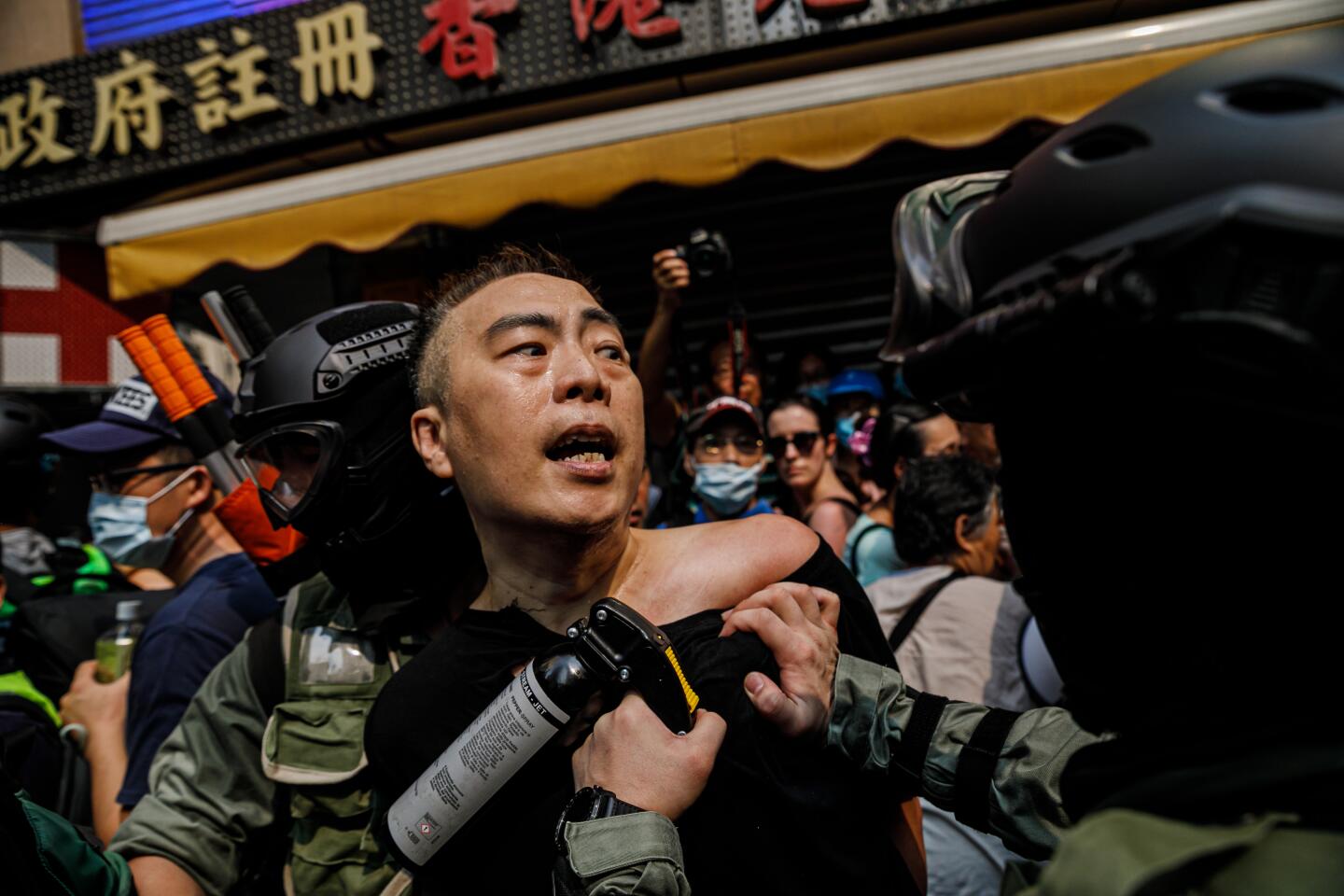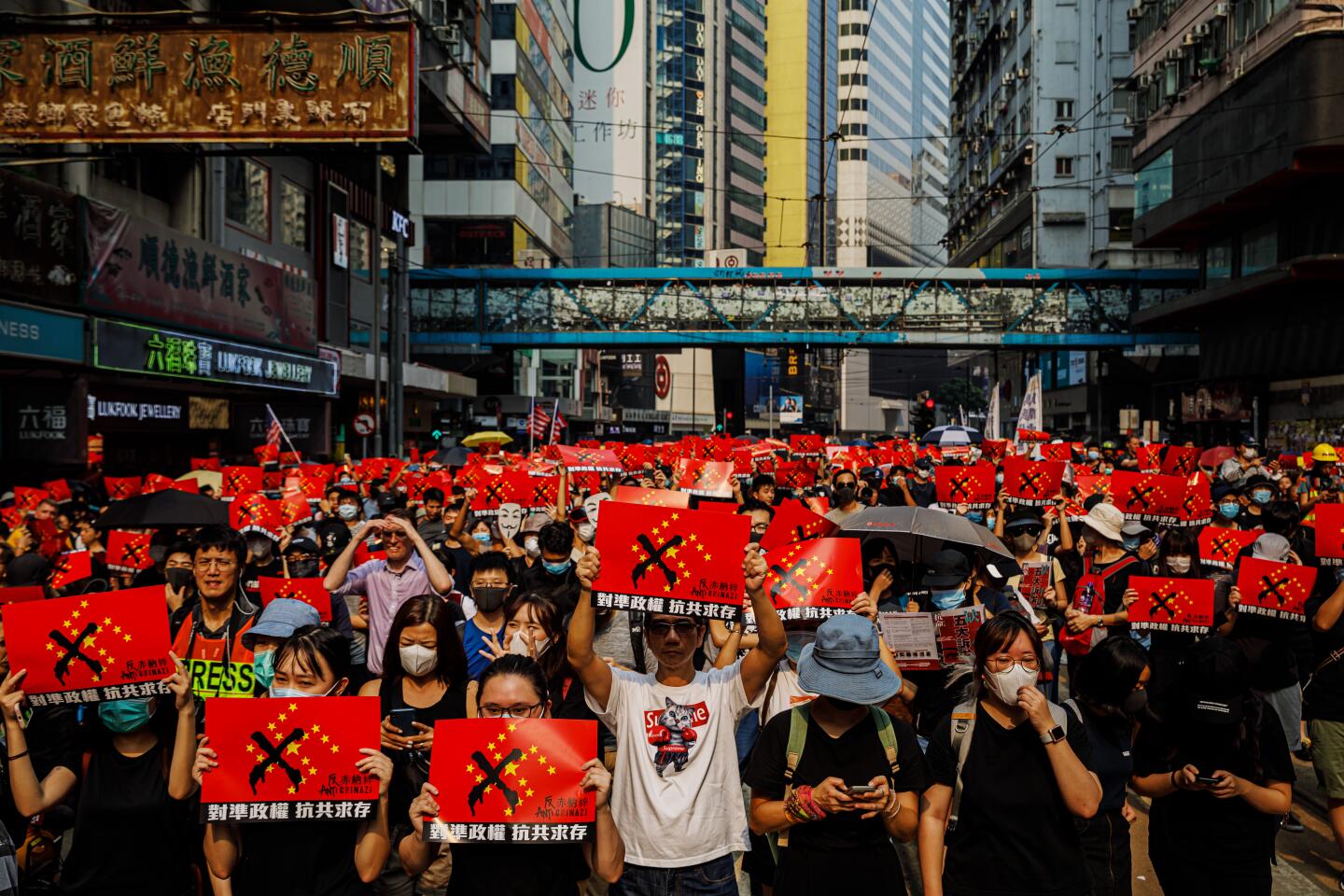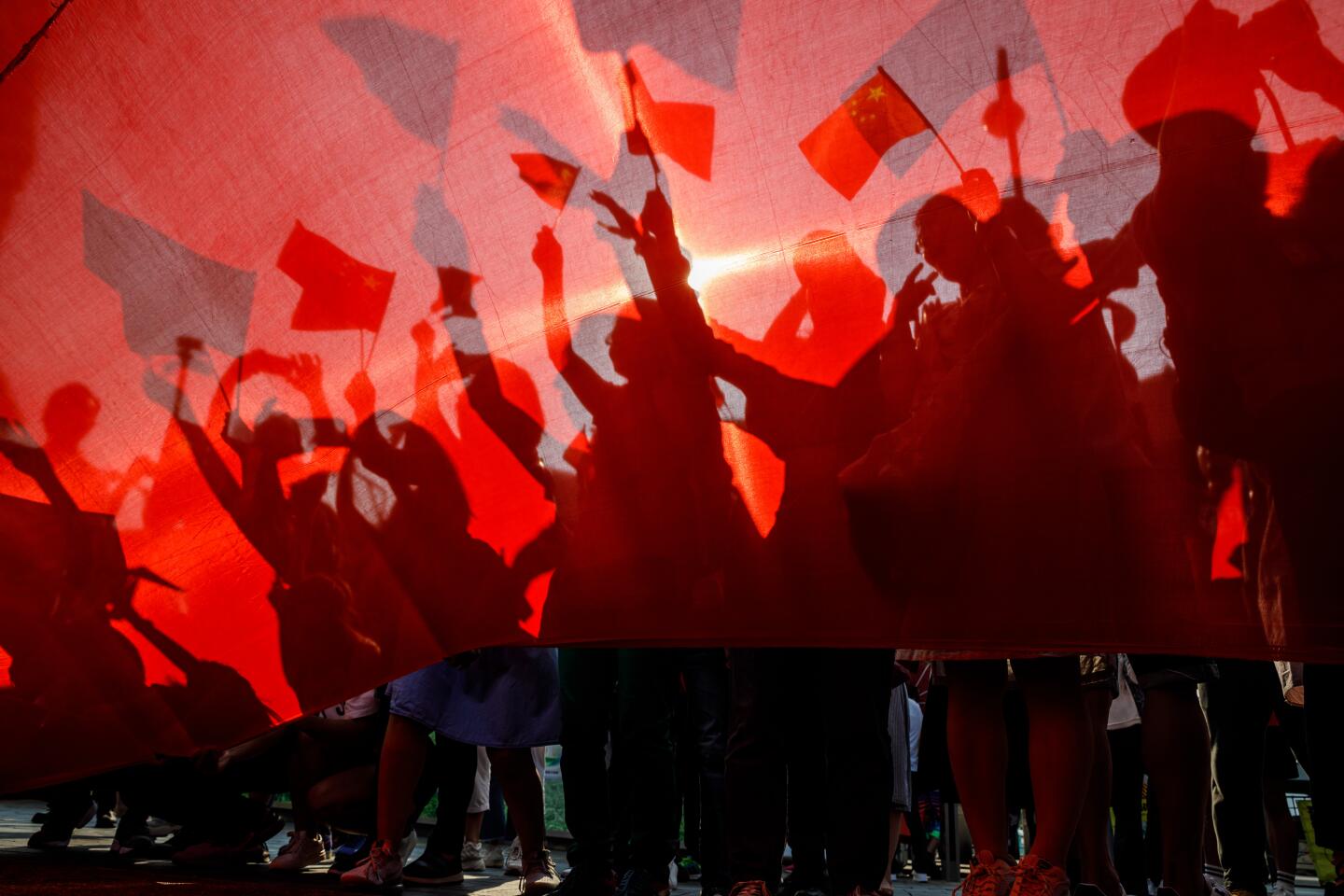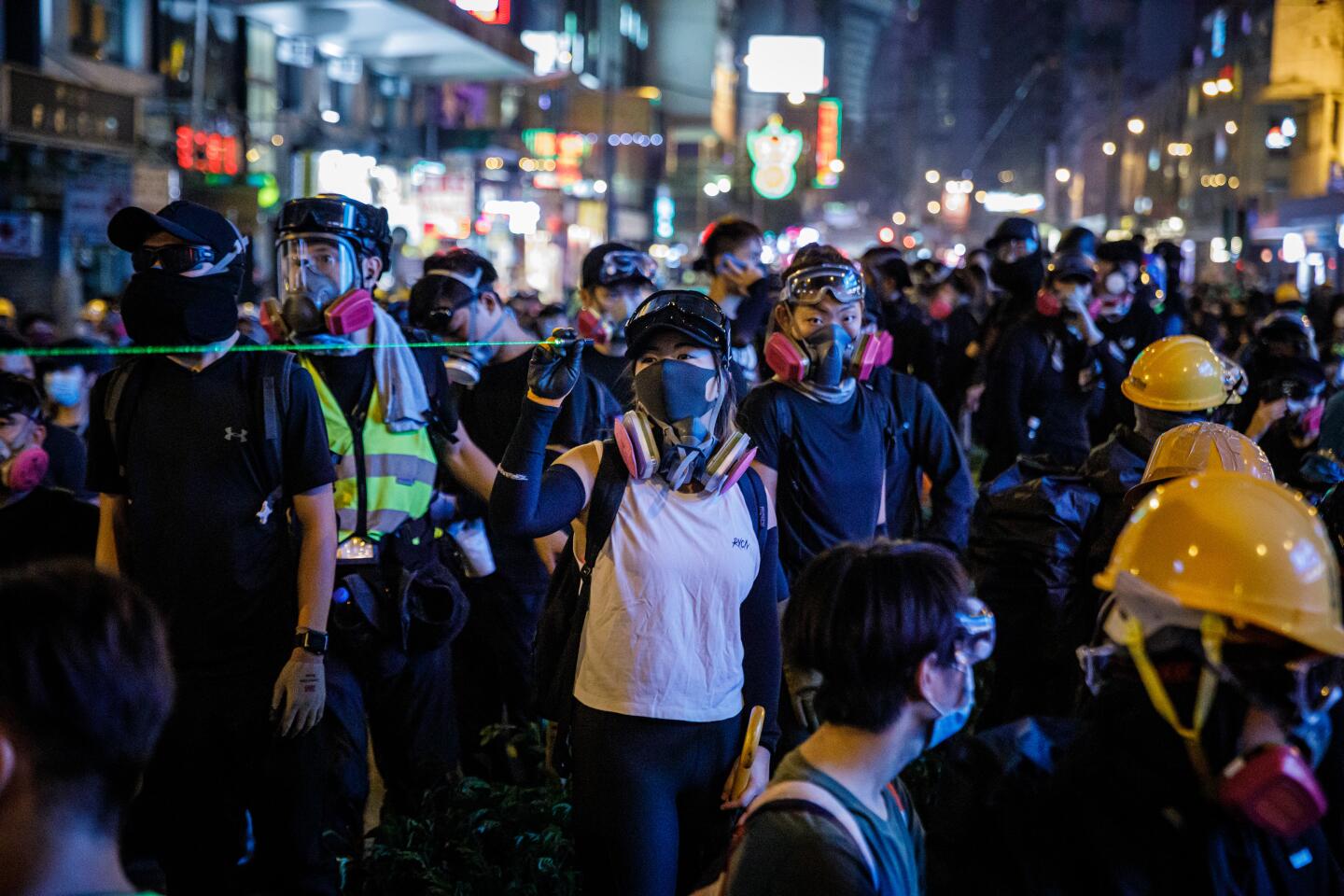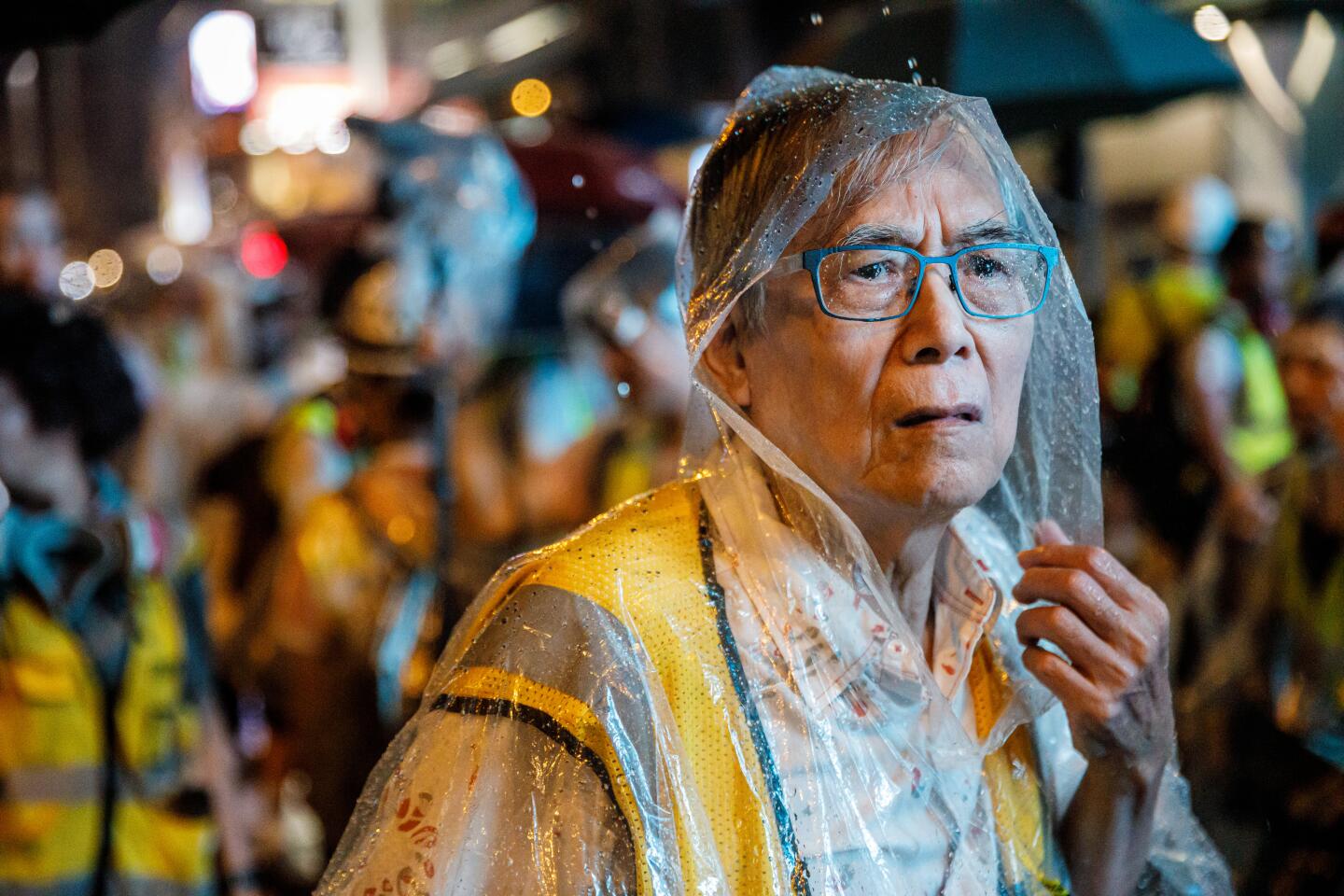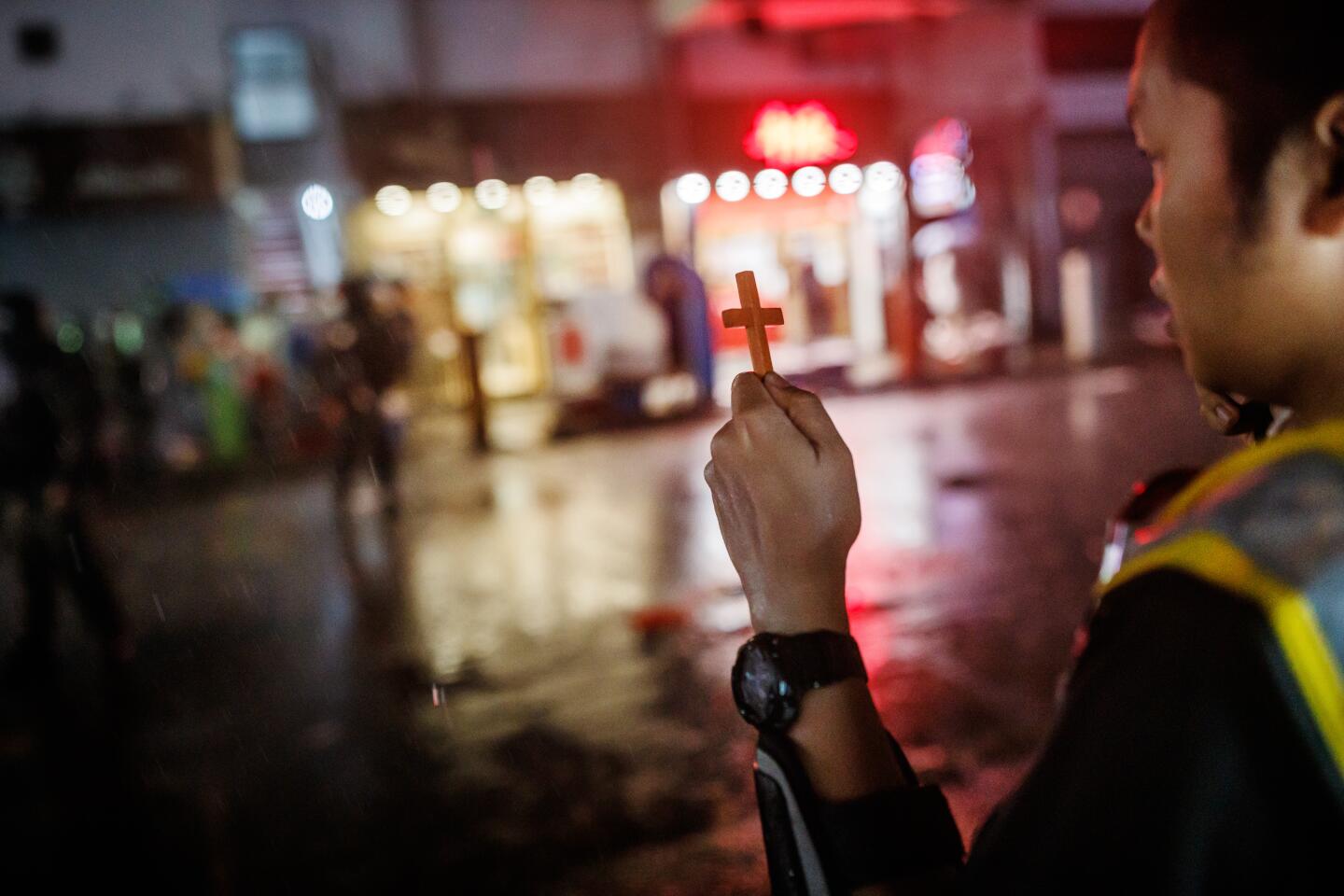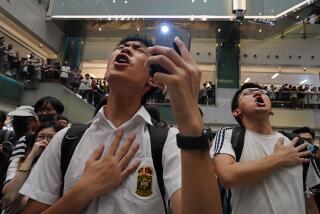Hong Kong protesters step on images of Xi Jinping’s face and appeal to the world
HONG KONG — As China’s Communist Party prepares for its 70th anniversary of rule on Oct. 1, protesters in Hong Kong stepped on and, in some cases, stomped on printed images of Chinese President Xi Jinping’s face as they streamed up the stairs of a subway station Sunday to attend a pro-democracy rally.
“SAY NO TO CHINAZI,” read a silhouetted slogan projected onto the Chinese military’s building in the semiautonomous Chinese territory. The word is a newly popular term in Hong Kong’s protest movement: China + Nazi, a derogatory framing of Beijing’s governance.
As officials in Beijing seek to stem dissent and mobilize the nation to sing the praises of the People’s Republic, protesters in Hong Kong are dancing to a different tune.
Hundreds of thousands attended a rally for the fifth anniversary of the Umbrella Movement on Saturday, according to organizers, and thousands marched in a “global anti-totalitarianism” march Sunday. Both protests rejected Beijing’s influence and celebrated Hong Kong’s pro-democratic history.
Both became violent, with flareups across the city. On Saturday, police dispersed crowds with pepper spray after some protesters threw bricks at them, then stopped and searched young people wearing black in shopping and financial districts, making arrests that triggered angry confrontations.
“Gangsters! Release them!” passersby shouted.
On Sunday, police and protesters fought open street battles with tear gas, rubber bullets, bricks and Molotov cocktails, back and forth through Hong Kong Island’s central streets.
What started as a movement against an extradition bill that would have allowed deportation of suspected criminals to China has become a struggle between autonomy and autocratic control.
“This is not just a Hong Kong internal issue. We are standing up for ... universal values, for democracy, for freedom, for justice, for the world and the next generation,” said Shelley, 27, who was marching with her mother and, like most protesters, asked not to use her full name for protection from authorities and Beijing supporters.
“Many countries want to have peace even if it is superficial. They are tolerating what the Beijing government is doing,” said a 22-year-old protester carrying a large U.S. flag. He asked to go by C, his first initial.
“They are treating the Uighurs very inhumanely. They are put in concentration camps,” he said, referring to China’s detention and forced reeducation of more than a million minority Muslims in the northwestern province of Xinjiang. “These actions should not be tolerated in the world right now. But they are letting it happen.”
A procession of protesters waved flags from the 17 countries and territories where solidarity marches also took place Sunday, including in rainy Taiwan, where more than 10,000 people marched in support of Hong Kong’s movement.
“There’s no blood, but it’s a war,” said Tsai Yu-hsin, 32, holding a sign that said “Hold up Hong Kong.”
For some older protesters, resistance to the Communist Party is personal.
Many Hong Kongers were born in mainland China but fled to Hong Kong as refugees escaping the Communist Party’s 1949 takeover and policies that led to mass famine and bloodshed, including the 1989 massacre of student demonstrators in Beijing’s Tiananmen Square.
“I have no grudge against any Chinese national, but I know how the communist system works,” said Wong, 69, who was born in mainland China but grew up in Hong Kong. “They always hold that their authoritarian government is for the good of the people. But even Mao Tse-tung failed and failed miserably, and we know that.”
Wong said his family, like many others in Hong Kong, sent food supplies to mainland China during the Cultural Revolution. Another protester, William Yun, 67, said he’d done the same.
“My father and grandfather, all the family members, shared what we had. Clothing, food, when they were in poor conditions, we shared [with] the countrymen in red China,” Yun said. “We helped — but now we are suppressed. It’s very unfair to the Hong Kong people.”
Yun said he supported those resisting Chinese encroachment on the post-1997 “one country, two systems” agreement under which Hong Kong is part of China, but would be allowed for 50 years to retain the high degree of autonomy it had under British rule.
“This is not an independence movement. This is only the cry of the people for justice,” he said.
“They suppose they are rich, they are the happiest — just like North Korea. They are the happiest people in the world, they think,” Yun said of mainlanders. “They are birds in a cage.”
Ken Chan, 24, said Beijing’s heavy hand explains why only one of five demands, on the extradition bill, has been met after 17 weeks of mass protests.
“The chief executive, Carrie Lam, has no way to make promises to Hong Kong people, because she has to ask for approval from the CCP,” he said. “We just want Hong Kong to be ruled by Hong Kong people.”
During Sunday’s protests, police pounced on demonstrators, in some cases grinding their faces into the ground. The protesters, meanwhile, hurled bricks and Molotov cocktails at the officers.
“When Hong Kong police enforce their rule, they are enforcing the rule of the CCP,” said Louis, 23, who was throwing bricks at the police. “That’s why we call them communist dogs now.”
Authorities in Hong Kong and Beijing have repeatedly condemned “violent rioters” for actions such as throwing bricks and have alleged that foreign “black hands” are supporting them.
But recent polling by the Chinese University of Hong Kong shows 69% of Hong Kong citizens blame the government and police for escalating violence. An additional 12% blame protesters, and 12% blame foreign forces.
“The government and police are very rough. They have pushed young people and Hong Kong citizens into a corner,” said Frankie, 53, watching masses of protesters sprint away from police. “If you push the young people more, the young people will react more.”
He said he would come out to march on Oct. 1, even though it was unlikely that Lam — who will be in Beijing for the 70th anniversary and will return to Hong Kong at night — would give in to the other demands: investigation of police violence, amnesty for arrested protesters, retraction of the labeling of protests as “riots” and granting of universal suffrage.
“It’s four months now. At least one-third to half of Hong Kong people have come out to support everything,” he said. “It’s very tiring. But we’re still here.”
Su is a Times staff writer and Ho Kilpatrick a special correspondent. Special correspondent Ralph Jennings in Taipei, Taiwan, contributed to this report.
More to Read
Sign up for Essential California
The most important California stories and recommendations in your inbox every morning.
You may occasionally receive promotional content from the Los Angeles Times.
